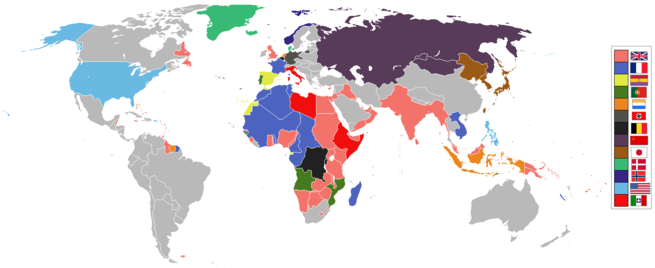
-
Empire
An empire is a sovereign state functioning as an aggregate of nations or people that are ruled over by an emperor or another kind of monarch. The territory and population of an empire is commonly of greater extent than the one of a kingdom.An empire can be made solely of contiguous territories, such as the Austro-Hungarian Empire or the Russian Empire, or of territories far remote from the homeland, such as a colonial empire. Aside from the more formal usage, the word empire can also refer colloquially to a large-scale business enterprise (e.g. a transnational corporation), a political organisation controlled by a single individual (a political boss), or a group (political bosses). The word empire is associated with such other words as imperialism, colonialism, and globalization. Empire is often used to describe a displeasure to overpowering situations.An imperial political structure can be established and maintained in two ways: (i) as a territorial empire of direct conquest and control with force or (ii) as a coercive, hegemonic empire of indirect conquest and control with power. The former method provides greater tribute and direct political control, yet limits further expansion because it absorbs military forces to fixed garrisons. The latter method provides less tribute and indirect control, but avails military forces for further expansion. Territorial empires (e.g. the Mongol Empire and Median Empire) tend to be contiguous areas. The term, on occasion, has been applied to maritime empires or thalassocracies (e.g. the Athenian and British empires) with looser structures and more scattered territories.
-
Kingdom (noun)
A realm having a king and/or queen as its actual or nominal sovereign.
-
Kingdom (noun)
A realm, region, or conceptual space where something is dominant.
“the kingdom of thought”
“the kingdom of the dead”
-
Kingdom (noun)
A rank in the classification of organisms, below domain and above phylum; a taxon at that rank (e.g. the plant kingdom, the animal kingdom).
-
Empire (noun)
A political unit having an extensive territory or comprising a number of territories or nations and ruled by a single supreme authority.
-
Empire (noun)
A political unit that controls at least one kingdom under its vassalage.
-
Empire (noun)
A group of states or other territories that owe allegiance to a foreign power.
-
Empire (noun)
A state ruled by an emperor.
“The Empire of Vietnam was a short-lived client state of Japan governing Vietnam between March 11 and August 23, 1945.”
-
Empire (noun)
An expansive and wealthy corporation.
“the McDonald’s fast food empire”
-
Empire (adjective)
alternative case form of Empire.
-
Kingdom (noun)
a country, state, or territory ruled by a king or queen
“the Kingdom of the Netherlands”
-
Kingdom (noun)
a realm associated with or regarded as being under the control of a particular person or thing
“the kingdom of dreams”
-
Kingdom (noun)
the spiritual reign or authority of God.
-
Kingdom (noun)
the rule of God or Christ in a future age.
-
Kingdom (noun)
heaven as the abode of God and of the faithful after death.
-
Kingdom (noun)
each of the three traditional divisions (animal, vegetable, and mineral) in which natural objects have conventionally been classified.
-
Kingdom (noun)
the highest category in taxonomic classification.
-
Empire (noun)
an extensive group of states or countries ruled over by a single monarch, an oligarchy, or a sovereign state
“the Roman Empire”
-
Empire (noun)
supreme political power over several countries when exercised by a single authority
“he encouraged the Greeks in their dream of empire in Asia Minor”
-
Empire (noun)
absolute control over a person or group.
-
Empire (noun)
a large commercial organization owned or controlled by one person or group
“her business empire grew”
-
Empire (noun)
an extensive sphere of activity controlled by one person or group
“each ministry, each department had its own empire, its own agenda and worked to protect its turf”
-
Empire (adjective)
denoting a style of furniture, decoration, or dress fashionable chiefly during the First Empire in France. The decorative style was neoclassical but marked by an interest in Egyptian and other ancient motifs.
-
Empire (adjective)
denoting produce from the Commonwealth.
